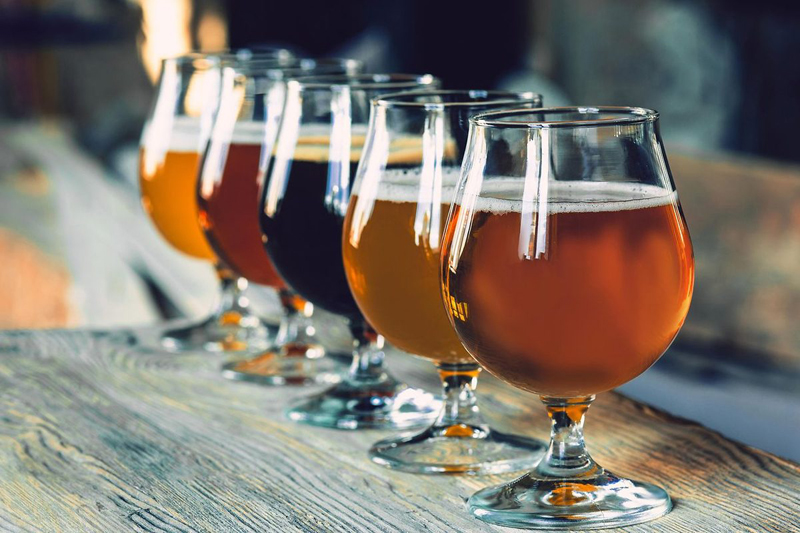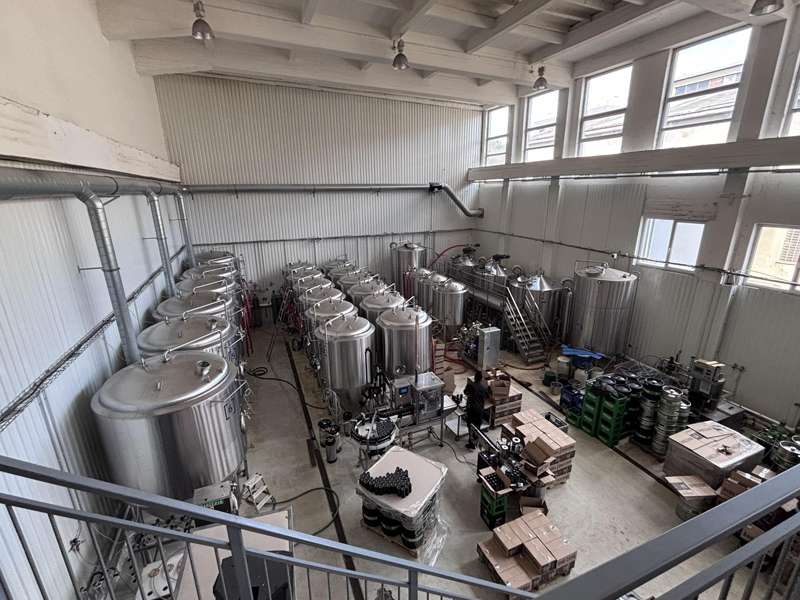Differences Between Craft Beer And Industrial Beer
Beer, one of the world’s most popular beverages, has evolved into two main categories: craft beer and industrial beer. While both share common ingredients, they differ significantly in production methods, flavor profiles, and overall consumer experience. Craft beer is known for its small-batch production, use of high-quality ingredients, and focus on innovation and unique flavors. It often reflects local brewing traditions and the creativity of the brewer. Industrial beer, on the other hand, is produced on a massive scale, prioritizing consistency, cost-efficiency, and wide distribution. These beers tend to have milder flavors that appeal to a broad audience. The rise of craft beer has brought a resurgence of interest in artisanal brewing, while industrial beer remains a dominant force in the global market. This article explores the key differences between craft and industrial beer, examining how they shape the drinking experience for different types of beer enthusiasts.
1.History of Craft Beer and Industrial Beer
Craft Beer Origins
Craft beer has its roots in traditional brewing practices that date back thousands of years. Early civilizations, such as the Sumerians and Egyptians, brewed beer on a small scale, using locally available ingredients and primitive techniques. The modern craft beer movement, however, began in the late 20th century as a response to the mass-produced, standardized beers that had come to dominate the market. In the 1970s and 1980s, homebrewers and small-scale brewers, especially in the United States, sought to revive old brewing methods and create beers with more distinctive flavors and character. Influential breweries such as Anchor Brewing, Sierra Nevada, and Boston Beer Company spearheaded this movement, emphasizing quality ingredients, innovation, and a return to artisanal techniques. Craft beer quickly gained popularity as consumers began seeking more diverse and flavorful options, giving rise to a global craft beer culture focused on creativity and community.
Industrial Beer Development
The development of industrial beer is closely tied to the industrial revolution of the 19th century. Advances in brewing technology, such as refrigeration, pasteurization, and steam-powered brewing equipment, enabled breweries to scale up production and distribute beer over long distances. Large-scale breweries emerged during this period, with companies like Anheuser-Busch, Heineken, and Carlsberg leading the charge. Industrial beer production focused on efficiency, consistency, and cost-effectiveness, using advanced machinery and scientific brewing methods to create beer that could be mass-produced and distributed globally. The rise of industrial beer in the 20th century made beer more accessible to the masses, but it also led to a homogenization of flavors as large breweries prioritized uniformity over variety. While industrial beer continues to dominate the global market, its focus on mass production contrasts sharply with the artisanal approach of craft brewing.
2.Key Differences Between Craft Beer and Industrial Beer
2.1 Ingredients and Quality
Craft beer is known for its focus on high-quality ingredients. Brewers typically use traditional ingredients like malted barley, hops, yeast, and water, often sourcing them locally or organically. The goal is to create distinctive flavors, and many craft brewers also experiment with specialty grains, fruits, herbs, and spices. Industrial beer, in contrast, often prioritizes cost-efficiency. To achieve this, industrial brewers may use cheaper adjuncts such as corn, rice, or sugar to reduce costs, which can lead to a lighter body and more neutral flavor. The focus is on creating a consistent product rather than exploring unique ingredients or flavors.
2.2 Brewing Methods
Craft brewers tend to rely on small-batch production techniques that emphasize traditional and artisanal methods, such as open fermentation or barrel aging. The brewing process is often more labor-intensive, allowing for greater experimentation and attention to detail. Industrial beer, on the other hand, is brewed using highly automated systems that maximize efficiency and output. Industrial breweries focus on standardized processes to ensure that every batch of beer tastes the same, regardless of where it’s brewed or when it’s consumed.
2.3 Flavor Profiles
Craft beer is celebrated for its diversity of flavors, ranging from intensely hoppy IPAs to rich, malty stouts, and everything in between. The use of unique ingredients and creative brewing methods results in bold, complex, and often experimental flavors. Industrial beer, however, is brewed with mass appeal in mind, resulting in simpler, more neutral flavors. Popular industrial beer styles like lagers and pilsners tend to be light, crisp, and easy-drinking, but they often lack the depth and complexity found in craft beer.
2.4 Production Scale and Distribution
Craft breweries generally produce smaller quantities of beer and focus on regional or local distribution. Many craft brewers distribute their products primarily through taprooms, specialty bars, and local stores, with limited reach beyond their immediate areas. In contrast, industrial breweries operate on a massive scale, producing millions of barrels annually. Their extensive distribution networks allow them to reach global markets, making their beer available in supermarkets, convenience stores, and bars worldwide.
2.5 Marketing and Branding
Craft beer marketing often revolves around storytelling, creativity, and local identity. Craft breweries tend to highlight their artisanal roots, the passion of the brewers, and the unique qualities of their beer. Labels and packaging are often designed with originality in mind, reflecting the brewery’s personality. Industrial beer brands, in contrast, rely heavily on large-scale marketing campaigns that emphasize tradition, quality, and social experiences. These companies invest billions in advertising, often sponsoring major events like sports championships to maintain a global presence.
2.6 Price and Availability
Due to the smaller production scale and use of higher-quality ingredients, craft beer is typically more expensive than industrial beer. Craft brews are often priced at a premium, especially for limited-edition or specialty beers. Additionally, craft beer is not as widely available, often found only in select markets, taprooms, or specialty shops. Industrial beer, being produced on a massive scale, benefits from economies of scale, allowing for lower prices. It is readily available at supermarkets, convenience stores, and bars around the world.
2.7 Innovation and Creativity
Craft breweries are known for pushing the boundaries of beer styles and flavors, with a strong emphasis on experimentation. Brewers may create limited-edition brews, collaborate with other artisans, or revive traditional brewing techniques. This spirit of innovation is a hallmark of the craft beer movement. Industrial beer, however, tends to prioritize consistency and predictability, leaving little room for innovation. While some industrial brewers have introduced craft-style offerings in response to consumer demand, the focus remains on producing beers that appeal to the broadest possible audience.
2.8 Consumer Experience
Craft beer enthusiasts often seek out breweries to enjoy a more personal and immersive drinking experience. Many craft breweries offer on-site taprooms where customers can interact with the brewers, tour the facilities, and try experimental or limited-edition beers. Craft beer is frequently seen as part of a broader cultural experience that values quality, authenticity, and community. Industrial beer, by contrast, is often consumed in more casual settings, such as parties or sporting events. Its widespread availability and consistency make it a go-to choice for social gatherings, but the consumer experience is typically less personal than with craft beer.
This comparison highlights the many ways craft and industrial beer differ, from the ingredients and brewing methods to the overall consumer experience. Each has its place in the market, offering something unique to different kinds of beer lovers.
3.Types of Brewing Yeasts
The cultural impact and community connection of craft beer and industrial beer vary significantly, reflecting their differing approaches to production, marketing, and consumer engagement.
Craft Beer
Craft beer is often deeply intertwined with local culture and community. Craft breweries typically emphasize authenticity, local ingredients, and traditional brewing methods, which resonate with consumers seeking unique, high-quality products that reflect the character of a particular region. Many craft brewers engage directly with their communities by hosting events, collaborating with local artists and chefs, or sponsoring local initiatives. Taprooms and brewpubs often serve as gathering places for people to socialize, fostering a sense of community around the brewery. Craft beer is also seen as a celebration of creativity and diversity, with brewers continuously experimenting with new flavors, styles, and brewing techniques. This cultural connection has helped the craft beer movement become more than just a business—it’s a way for communities to come together and share a passion for unique, locally produced beverages.
Industrial Beer
Industrial beer, while not as closely tied to local communities, has had a significant cultural impact on a global scale. Major beer brands like Budweiser, Heineken, and Corona have become iconic symbols, often associated with celebrations, sporting events, and social gatherings. Through massive advertising campaigns, industrial beer brands have embedded themselves in global culture, using sponsorships of major sporting events and festivals to create a broad social presence. While industrial beer may lack the community-focused identity of craft beer, it plays a key role in creating shared experiences on a larger scale. Its widespread availability and accessibility make it a go-to choice for casual consumption, providing a consistent product that people around the world recognize and enjoy.
Craft beer fosters a stronger local connection and cultural identity, while industrial beer impacts global culture through its mass-market presence and association with social events and entertainment. Both types of beer contribute to their respective cultural landscapes, albeit in different ways.
Summary
Craft beer and industrial beer represent two distinct approaches to brewing, each offering unique experiences to consumers. Craft beer is celebrated for its focus on quality ingredients, artisanal methods, and creativity, often reflecting the culture and community where it’s brewed. It emphasizes small-scale production, diverse flavors, and a deep connection with local consumers. Industrial beer, by contrast, is designed for mass production and global distribution, focusing on consistency, affordability, and wide appeal. Its presence in global culture is reinforced by large marketing campaigns and associations with major social events.
While craft beer appeals to those seeking unique and innovative flavors, industrial beer remains a popular choice for its accessibility and reliability. Both forms of beer have their place in the market, catering to different tastes and preferences. Ultimately, the choice between craft and industrial beer depends on the consumer’s desire for either experimentation and local authenticity or consistency and availability on a global scale.
Get A Turnkey Brewery Solutions
Whether you're producing craft beer or industrial beer, having the right brewery equipment is essential for success. Alston Brew offers comprehensive turnkey brewery solutions designed to meet the unique needs of every brewery, from small craft operations to large industrial facilities. Our turnkey systems include everything you need to streamline your brewing process, from brewing and fermentation tanks to packaging equipment, ensuring optimal efficiency and quality control.
At Alston Brew, we work closely with our clients to tailor equipment solutions that match their production goals, whether it's for experimental craft brews or high-volume industrial beers. We provide expert consultation, customized designs, and reliable technical support to help you optimize your brewery's performance. With our turnkey solutions, you can focus on brewing great beer while we handle the technical details. Contact us today to learn how Alston Brew can help you build a brewery that meets your exact specifications.
 Jinan Alston Equipment Co.,Ltd.
Jinan Alston Equipment Co.,Ltd.


